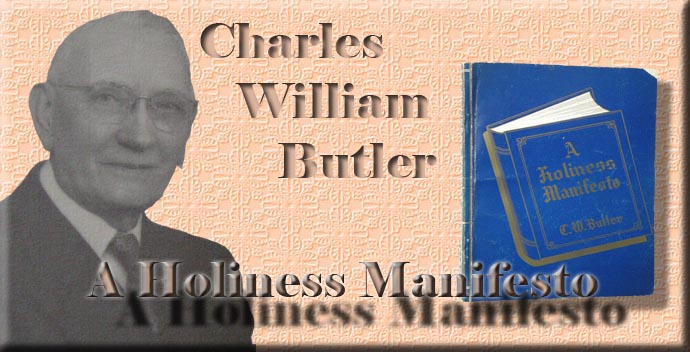
A Holiness Manifesto
By Charles William Butler
Chapter 14
Holiness And WorshipWhen John was conducted by one of his glorified fellow-servants in his survey of the Holy City, he fell down to worship, "Then saith he unto me, see thou, do it not... . Worship God" (Rev. 22:9). Jesus, when instructing the woman at Jacob's well, who inquired about the place to worship declared, "The hour cometh, and now is, when the true worshippers shall worship the Father in spirit and in truth; for the Father seeketh such to worship him. God is a Spirit: and they that worship him must worship him in spirit and in truth" (John 4:23,24). Again, the inspired writer had the true vision of worship expressed in the 96th Psalm, where he associates our worship of God with his glory (verses 7, 8 and 9): "Give unto the Lord O ye kindreds of the people, give unto the Lord glory and strength. Give unto the Lord the glory due unto his name; bring an offering and come into his courts. O worship the Lord in the beauty of holiness." Worship is the highest exercise of which the human soul is capable. To be prepared to worship God as his Word instructs, we need to be truly sanctified. We need the experience of holiness in order to worship the Lord in the beauty of holiness, and give him the glory due unto his name. We live in temples of clay. The material things about us are very real. Without the clarifying of our souls and the impassioning of our lives by the sanctifying grace of the Spirit of God, we are very apt to experience, even after the grace of regeneration, the fulfillment of the poet's picture when he declared, "Our souls, how heavily they go, to reach eternal joys." Again, "And shall we ever live at this poor dying rate?" I am by no means advancing the thought that possessors of Christian holiness live in a frame of ecstasy continually, or that we do not have periods of suffering temptation; but I do say that wherever the Spirit abides in a cleansed heart, the fervency and fire of devotion which condition us for the worship of God in spirit and in truth are continually fed as having the source of the same dwelling within. How this grace does supply us with holy devotion for the spiritual worship of God. We do not have to assemble in a public place of worship to experience this, though when we possess it we certainly will avail ourselves of all such opportunities, but it is a heart-condition and life-experience which is in a very proper sense continuous. The song writer of Israel cried out, "While I was musing the fire burned." Holy men and women worship God while at their work, riding on trains or in busses, driving automobiles, or plowing furrows in the fields or washing dishes in the kitchen. There is such a harmonizing of our spirits with the divine Spirit and such sacred and perfected relationship between us and God that the experience of the Psalmist is often repeated. "We muse and the fire burns." The gracious benefits of the grace of entire sanctification are such that if believers were perfectly safe so far as the eternal future is concerned without it, they could not afford to continue to live in the present world without this grace which brings such gracious benefits into the life and which is obtainable immediately by faith in Jesus Christ. The question is not, "Who can live it?" It is rather, "Who can live as he ought to without it?" Dear reader, accept no substitute and make no delay in your personal possession of this Blood bought grace. It is Father's will that you should be sanctified. The blood of his Son was shed to make it possible and the Holy Spirit is now present where you are to make it real. The Word has revealed it and as God's ambassador I am commissioned to declare this truth and to call believers in Jesus to immediate possession of this grace. |
|
 |
 |
|
|
|
-
Site Navigation
 Home
Home What's New
What's New Bible
Bible Photos
Photos Hiking
Hiking E-Books
E-Books Genealogy
Genealogy Profile
Free Plug-ins You May Need
Profile
Free Plug-ins You May Need
 Get Java
Get Java.png) Get Flash
Get Flash Get 7-Zip
Get 7-Zip Get Acrobat Reader
Get Acrobat Reader Get TheWORD
Get TheWORD